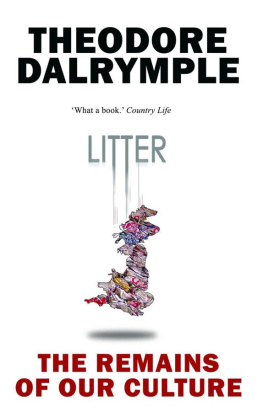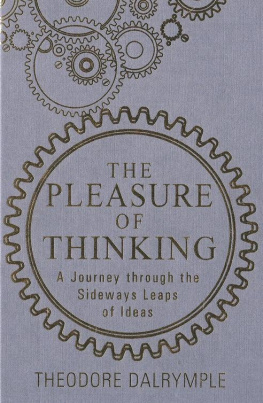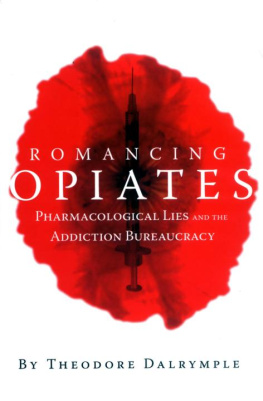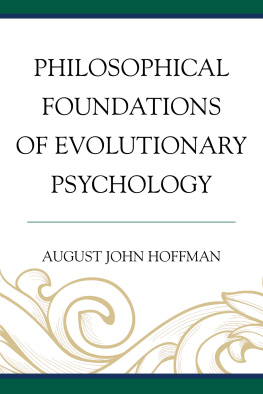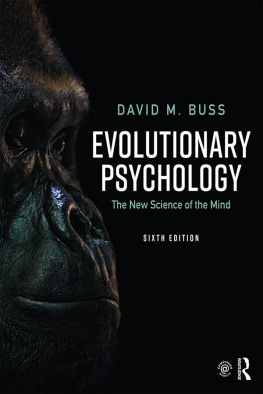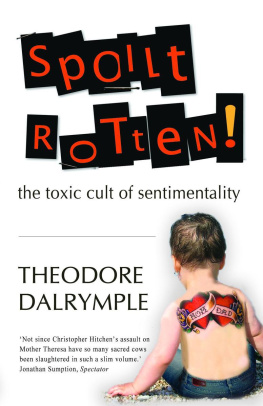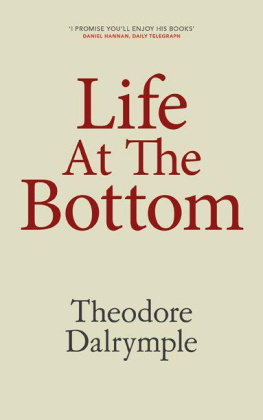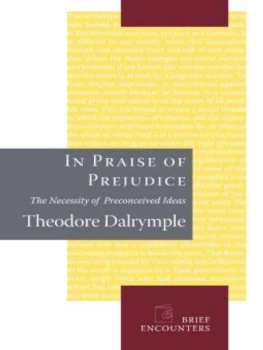ADMIRABLE EVASIONS


2015 by Theodore Dalrymple
All rights reserved. No part of this publication may be reproduced, stored in a retrieval system, or transmitted, in any form or by any means, electronic, mechanical, photocopying, recording, or otherwise, without the prior written permission of Encounter Books, 900 Broadway, Suite 601, New York, New York, 10003.
First American edition published in 2015 by Encounter Books, an activity of Encounter for Culture and Education, Inc., a nonprofit, tax-exempt corporation.
Encounter Books website address: www.encounterbooks.com
The paper used in this publication meets the minimum requirements of ANSI/NISO Z39.481992 (R 1997) (Permanence of Paper).
FIRST AMERICAN EDITION
LIBRARY OF CONGRESS CATALOGING-IN-PUBLICATION DATA
Dalrymple, Theodore.
Admirable evasions : how psychology undermines morality / by Theodore Dalrymple.
pages cm
Includes bibliographical references and index.
ISBN 978-1-59403-788-7 (ebook)
1. Self-perception. 2. Self-reliance. 3. Psychotherapy. 4. Psychoanalysis. 5. PsychologyMoral and ethical aspects. I. Title.
BF697.5.S43D35 2015
150dc23
2014037247
CONTENTS
FOR RICHARD LATCHAM
It is a poor centre of a mans actions, himself.
FRANCIS BACON
To be beautiful means to be yourself. You dont need to be accepted by others. You need to accept yourself.
THCH NHT HNH
... an admirable evasion of whoremaster man, to lay his goatish disposition to the charge of a star!
WILLIAM SHAKESPEARE
I n the misfortunes of our friends, wrote the duc de La Rochefoucauld nearly three and a half centuries ago, there is something not entirely unpleasing. When we read this for the first time we experience both a shock and a sense of recognition. Something discreditable about us has been put into words that, if we had reflected a little harder or more honestly upon ourselves, we should have known all along: and henceforth we shall never be able to pretend that we are other than complex and contradictory beings.
La Rochefoucauld was able to put into words what anyone could have known by attending to the motions of his own mind, as Doctor Johnson put it. Have human beings progressed beyond this in their self-understanding? It is my contention that they have not, and that our vaunted or pretended progress, amazing though it may be from a technological point of view, is actually a retrogression in honesty and sophistication. Psychology is not a key to self-understanding, but a cultural barrier to such understanding as we can achieve; but it is my belief that we shall never be able entirely to pluck out the heart of our mystery. Of this I am glad rather than sorry.
I f all the antidepressants and anxiolytics in the world were thrown into the sea, as Oliver Wendell Holmes Sr. once suggested should be done with the whole of the pharmacopoeia, if all textbooks of psychology were withdrawn and pulped, if all psychologists ceased to practice, if all university departments of psychology were closed down, if all psychological research were abandoned, if all psychological terms were excised from everyday speech, would Mankind be the loser or the gainer, the wiser or the more foolish? Would his self-understanding be any the less? Would his life be any the worse?
It is not, of course, possible to give a definitive answer to these questions: the experiment cannot be done. But it would be a bold man who claimed that Mans self-understanding is now greater than that of Montaigne or Shakespeare. How many of us would dare to claim in public that he had greater insight into his fellow creatures than the Swan of Avon? He would be laughed down immediately, ridiculed and ignominiously driven from the platform: and quite rightly so. Such arrogance would have its reward. As to life having improved, how much of the improvement is attributable to psychology? We owe incomparably more to improved sewers than to psychology.
Yet implicit claims to superior knowledge and understanding are by no means uncommon. More than one school of psychology has claimed to have achieved deeper insight into human nature, conduct, emotion, and distress than ever before. In 1802, the French philosophical physiologist Pierre-Jean-George Cabanis said confidently that the brain secretes thought as the liver secretes bile. Two hundred years later, the acclaimed neuroscientist V. S. Ramachandran said essentially the same thing, though in more words, as if verbosity indicated progress:
Even though it is common knowledge, it never ceases to amaze me that all the richness of our mental life all our feelings, our emotions, our thoughts, our ambitions, our love lives, our religious sentiments and even what each of us regards as his or her own intimate private self is simply the activity of these little specks of jelly in our heads, in our brains. There is nothing else.
So everything in human self-understanding is over bar the shouting: only the details have yet to be filled in. Before long, if there is sufficient research funding, there will be no more puzzles and no unpleasant surprises, no agonizing dilemmas in human existence; the question of the good life will have been settled once and for all, indubitably and scientifically, without the necessity of endless and unprovable metaphysical speculations. To understand all will no longer be to forgive all, for there will be nothing to forgive; everyone will behave reasonably in the first place, which is to say, in accordance with the dictates of the scientifically proven good life. History will come to an end, this time not by virtue of the triumph of liberal democracy throughout the world, but by that of the triumph of psychology and neuroscience. Man will no longer pass on misery to Man, as in Larkins poem; he will pass on knowledge instead, knowledge and wisdom being of course by that stage coterminous. Indeed, knowledge will secrete wisdom as the liver secretes bile.
I dont believe it, and Im not sure that I would want to live in such a world if it were true. How dull everything would be! Life would be a perpetual Caribbean cruise aboard a luxury liner on a calm sea in clement weather. Mankind would be bored for lack of causes of unhappiness and would soon sink the boat on which he was cruising: for Man is not so much a problem-solving animal as a problem-creating one. Pascal said that all of Mans misfortunes come from his inability to sit quietly in a room: but he did not claim to have found a way to enable him to do so, or suggest that this inability comes from anything other than his inherent nature.
The first psychological scheme of the twentieth century to provide the common man with the illusion of much expanded, if not yet complete, self-understanding, together with the hope of an existence free of inner and outer conflict, was psychoanalysis. Then came behaviorism, after which there was cybernetics. Sociobiology and evolutionary psychology were next; and now neuroscientific imaging, together with a little light neurochemistry, persuades us that we are about to pluck out the heart of our mystery. Suffice it to say, by way of deflation of exaggerated hopes and expectations, that 10 percent or more of the population now takes antidepressants, a figure all the more remarkable as the evidence is lacking that they, the antidepressants, work except in a very small minority of cases; rather the reverse. That they are taken in such large quantities is evidence more of dissatisfaction with life than of increased understanding of its causes, as well as of the spread of superstition regarding neurotransmitters and so-called chemical imbalances. These latter are to the modern person what alien spirits to be exorcised or the ego, id, and superego once were: things not seen but strongly believed in, as providing explanations for unwanted feelings, experiences, and behavior, as well as the hope of their elimination. Superstition springs as eternal in the human breast as hope.
Next page


